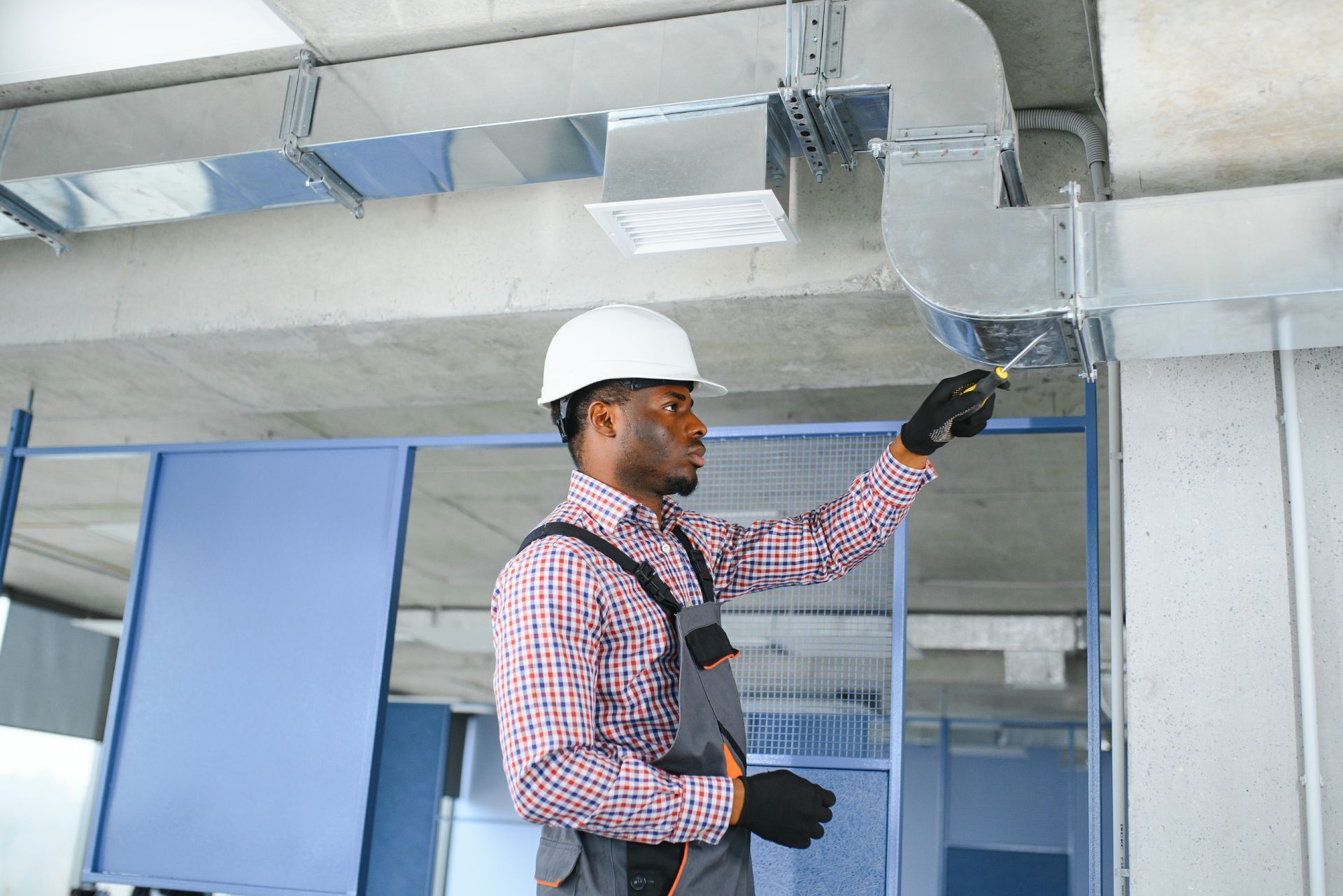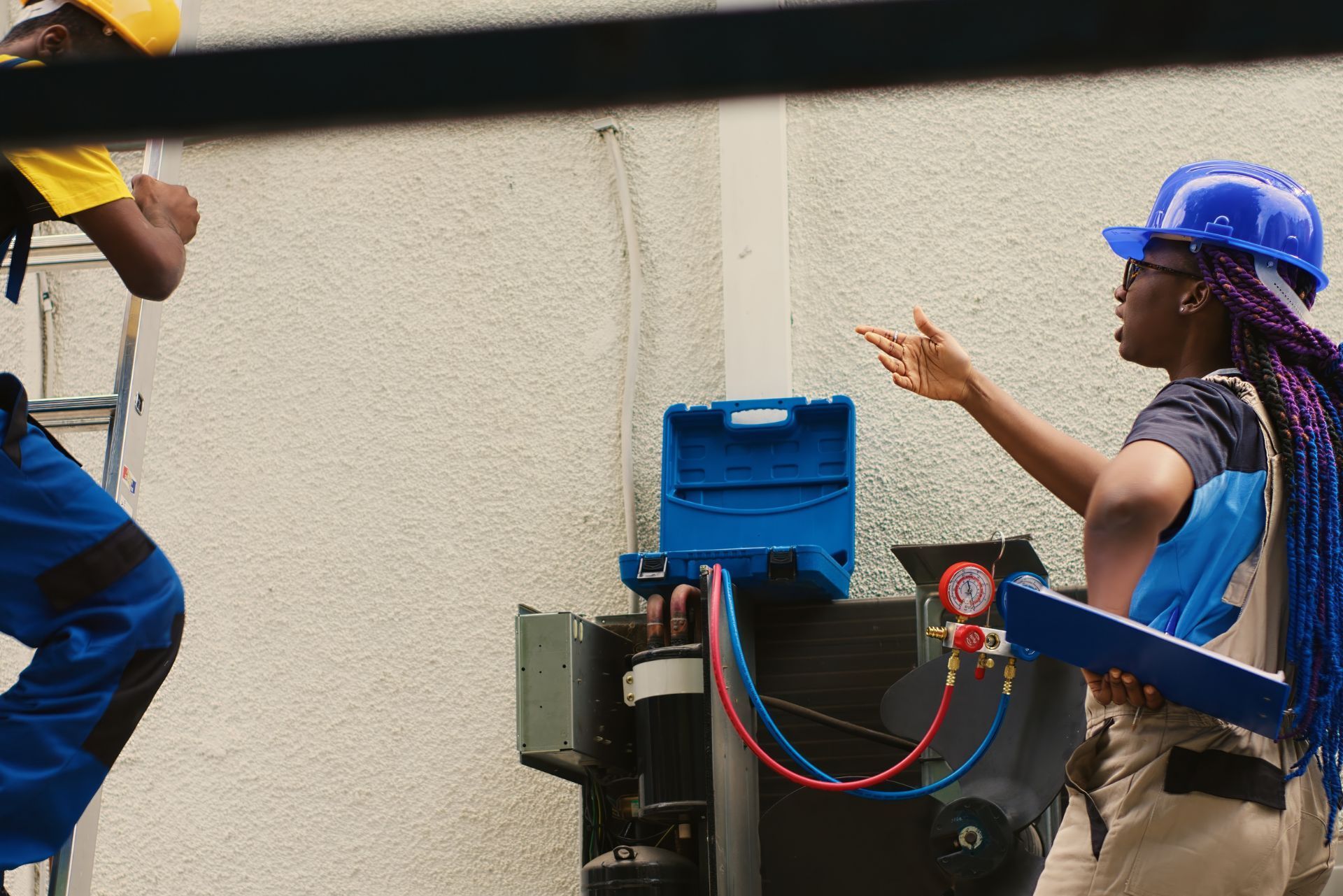Top 3 Recommended Policies

Running an HVAC business in North Carolina means balancing year-round demand with a mix of weather extremes and evolving building regulations. Contractors here face everything from hurricane season repairs along the coast to heating system installs in the mountains, each carrying its own set of risks. The right insurance coverage helps protect against costly claims, equipment damage, and liability issues that can disrupt operations. This guide breaks down HVAC contractor insurance in North Carolina, explaining which policies matter most, how weather and regulatory changes influence premiums, and what to consider when comparing coverage options. Whether you are managing a small crew or a growing company, understanding your insurance needs will help you protect your business and maintain client trust in a competitive market.
Understanding HVAC Contractor Insurance Basics
HVAC contractor insurance is designed to cover the unique risks associated with heating, ventilation, and air conditioning services. This insurance typically includes several key components:
- General Liability: Protects against third-party claims for bodily injury or property damage caused by your work.
- Property Insurance: Covers damage to your business property, including tools and equipment.
- Workers’ Compensation: Provides coverage for employees injured on the job.
- Commercial Auto Insurance: Covers vehicles used for business purposes.
- Bonds: Often required for contractual obligations, ensuring job completion and client protection.
Each of these coverages addresses different aspects of risk that HVAC contractors face daily. For example, if a technician accidentally causes water damage while installing a system, general liability insurance would typically cover the claim. Meanwhile, workers’ compensation ensures that injured employees receive medical care and lost wages without exposing the business owner to lawsuits.
North Carolina contractors must carefully evaluate their insurance needs based on business size, scope of work, and client requirements. According to Wexford Insurance, bundling these coverages can often provide cost savings and simplify claims management.
In addition to the essential coverages mentioned, HVAC contractors should also consider specialized policies that cater to their specific operational needs. For instance, equipment breakdown insurance can be crucial for businesses that rely heavily on costly machinery and tools. This type of coverage helps mitigate the financial impact of unexpected equipment failures, which can lead to significant downtime and loss of income. Furthermore, cyber liability insurance is becoming increasingly relevant as HVAC contractors adopt digital tools for scheduling, billing, and customer management, making them potential targets for cyberattacks.
Moreover, understanding the nuances of each coverage type is vital for contractors to ensure they are adequately protected. For example, not all general liability policies are created equal; some may have exclusions that could leave contractors vulnerable in certain situations. Therefore, it is advisable for HVAC professionals to work closely with insurance agents who specialize in the construction and contracting industry, as they can provide tailored advice and help navigate the complexities of policy options. This proactive approach not only safeguards the business but also enhances its reputation among clients who value reliability and professionalism.

How Much Does HVAC Liability Insurance Cost in North Carolina?
Insurance premiums for HVAC contractors vary widely depending on factors such as annual revenue, claims history, and coverage limits. On average, premiums range from 1.3% to 2.6% of annual gross revenue. For example, a small HVAC business earning around $150,000 annually might expect to pay roughly $3,140 in liability insurance premiums.
However, this cost is not fixed. Competitive shopping and working with knowledgeable brokers can significantly reduce premiums. In fact, some contractors have lowered their premiums to as little as $860 by exploring different insurance providers and coverage options.
These savings are crucial for small businesses operating on tight margins. Investing time in comparing policies and understanding coverage details can result in better protection at a more affordable price. For those interested in detailed premium statistics and strategies to reduce costs, Contractor Nerd provides valuable insights.
In addition to the factors already mentioned, the geographical location of the HVAC business within North Carolina can also influence insurance costs. Areas with higher populations or more competitive markets may see different rates compared to rural regions. Moreover, the type of services offered—such as residential versus commercial HVAC work—can further affect premiums, as commercial work often carries higher risks and, consequently, higher insurance costs.
Another important consideration for HVAC contractors is the inclusion of additional coverages, such as workers' compensation and equipment breakdown insurance. While these may increase the overall premium, they provide essential protection that can safeguard a business from significant financial loss due to unexpected events. Understanding the full scope of insurance needs and tailoring a policy accordingly can lead to a more comprehensive safety net for HVAC contractors in North Carolina.
Climate Risks and Their Impact on HVAC Insurance in North Carolina
North Carolina’s climate presents unique challenges for HVAC contractors and insurers alike. The state has experienced over 100 weather and climate disaster events since 1980, each causing losses exceeding $1 billion. This averages nearly three major events per year, including hurricanes, floods, and severe storms that can disrupt business operations and increase insurance claims.
These frequent disasters have led insurance companies to tighten coverage and raise premiums, reflecting the higher risks involved. Mark Hertsgaard, executive director of Covering Climate Now, highlights the broader economic implications: “Property that can’t be insured cannot obtain a mortgage... slashing their resale value could crash housing markets.” This underscores how climate change is reshaping insurance markets and, by extension, the HVAC industry.
For HVAC contractors, this means that insurance policies may become more expensive or harder to obtain in high-risk areas. It also emphasizes the importance of investing in resilient building practices and educating clients about the benefits of upgrades like wind-mitigated roofs, which have been shown to reduce claims by 35% and losses by 23% after hurricanes, according to a study by the North Carolina State University Institute for Advanced Analytics.
Understanding these climate-related risks and their insurance implications is essential for HVAC contractors aiming to maintain competitive pricing and reliable coverage. Moreover, the increasing frequency of extreme weather events necessitates a proactive approach to risk management. HVAC professionals may need to adopt advanced technologies such as smart HVAC systems that can better withstand temperature fluctuations and power outages. These systems not only enhance energy efficiency but also provide homeowners with peace of mind during severe weather, making them a valuable selling point.
Additionally, as North Carolina continues to grapple with the effects of climate change, there is a growing demand for sustainable HVAC solutions. Contractors who specialize in eco-friendly systems, such as geothermal heating and cooling or solar-powered HVAC units, may find themselves at a competitive advantage. Not only do these systems often qualify for tax incentives and rebates, but they also align with the increasing consumer preference for environmentally responsible choices. This shift in consumer behavior adds another layer of complexity to the insurance landscape, as insurers may begin to offer better terms for properties equipped with sustainable technologies, further influencing the decisions of HVAC contractors and their clients.

Building Code Changes and Their Insurance Implications
In 2024, North Carolina enacted House Bill 488, a legislative change that some experts argue weakens building codes. This development has raised concerns about increased insured losses during severe weather events, as less stringent codes may lead to more damage and higher claims.
For HVAC contractors, these changes could translate into greater liability exposure and challenges in securing insurance at reasonable rates. Insurance companies often assess risk based on compliance with building codes, and weaker standards might result in higher premiums or stricter policy terms.
Contractors should stay informed about local regulations and consider advocating for stronger codes that protect both homeowners and businesses. Additionally, educating clients on the value of compliance and proactive measures can help reduce claims and foster trust.
Moreover, the implications of House Bill 488 extend beyond immediate financial concerns. The long-term effects on community resilience and safety are significant. Weaker building codes can lead to a cumulative increase in property damage over time, especially in areas prone to natural disasters. As communities rebuild after severe weather events, the reliance on outdated or lax codes could hinder recovery efforts, leading to prolonged economic strain for both individuals and local governments.
Furthermore, the insurance landscape is evolving in response to these regulatory changes. Insurers may begin to implement more rigorous underwriting processes, scrutinizing not only the compliance history of contractors but also the overall safety records of the buildings they insure. This shift could encourage contractors to adopt more stringent self-regulatory practices, thereby enhancing their reputation and competitiveness in the marketplace. Staying ahead of these trends will be crucial for contractors looking to navigate the complexities of insurance in a changing regulatory environment.
More details on the impact of House Bill 488 and related insurance concerns can be found in the Insurance Journal’s feature article.
Claims Trends and What They Mean for HVAC Contractors
Claims data provides valuable insights into common risks and how insurance companies handle them. HVACi’s 2020 Annual Claims Report revealed that 51% of claimed perils were recategorized, and 15% of all claimed systems were found to be in proper working condition upon independent assessment.
This indicates a significant portion of claims may be disputed or denied, highlighting the importance of thorough documentation and clear communication with clients. HVAC contractors who maintain detailed records, perform quality work, and promptly address issues can reduce the likelihood of contested claims and build stronger relationships with insurers.
Moreover, understanding these claim trends helps contractors anticipate potential pitfalls and adjust their risk management strategies accordingly. It also reinforces the value of comprehensive insurance coverage that protects against both genuine claims and disputes.
Additionally, the data suggests that HVAC contractors should invest in ongoing training and development for their teams. By staying updated on the latest technologies and best practices, contractors can enhance their service quality, which in turn can lead to fewer claims. For instance, understanding the intricacies of modern HVAC systems, including energy-efficient models and smart technology, can empower technicians to perform more accurate installations and repairs, ultimately reducing the chances of future disputes.
Furthermore, the role of customer education cannot be overstated. By providing clients with clear information about system maintenance and operational best practices, HVAC contractors can foster a proactive approach to system care. This not only minimizes the risk of claims arising from misunderstandings but also positions the contractor as a trusted advisor in the eyes of the client, thereby enhancing customer loyalty and satisfaction. In an industry where reputation is paramount, these proactive measures can significantly impact a contractor's long-term success.
Choosing the Right HVAC Contractor Insurance in North Carolina
Selecting appropriate insurance coverage involves balancing cost, protection, and compliance with state requirements. HVAC contractors should assess their specific risks, including the size of their workforce, types of projects, and geographic exposure to climate hazards. For instance, contractors operating in areas prone to severe weather events, such as hurricanes or heavy snowfall, may need additional coverage to protect against property damage and business interruptions caused by these natural disasters. Understanding these nuances is essential for creating a comprehensive insurance plan that safeguards both the business and its clients.
Customer trust is also a crucial factor. A recent survey found that 73% of homeowners choose their HVAC contractor based on previous experiences, a 44% increase from the prior year. This trend underscores the importance of maintaining a professional reputation, which can be supported by having solid insurance coverage that reassures clients. Moreover, showcasing insurance credentials can serve as a powerful marketing tool, as it demonstrates a commitment to professionalism and accountability. Many homeowners feel more secure knowing that their contractor is insured, as it provides a safety net in case of accidents or mishaps during the project.
Working with an experienced insurance broker who understands the HVAC industry and North Carolina’s regulatory environment can help contractors tailor policies to their needs. Brokers can also assist in identifying discounts, bundling options, and risk mitigation strategies that lower premiums without sacrificing coverage. Additionally, they can provide insights into emerging trends in the HVAC market, such as the growing demand for energy-efficient systems and smart technology installations, which may influence the types of coverage needed. By staying informed and proactive, HVAC contractors can better navigate the complexities of insurance and ensure their business remains resilient in a competitive landscape.
Conclusion: Protecting Your HVAC Business in a Changing Landscape
North Carolina HVAC contractors face a dynamic environment shaped by climate risks, regulatory changes, and evolving customer expectations. Securing the right insurance coverage is not just a legal requirement but a strategic investment in the stability and growth of your business.
By understanding the types of insurance available, monitoring premium trends, and staying informed about local climate and building code developments, contractors can better navigate challenges and capitalize on opportunities. Prioritizing insurance also builds client confidence, helping to foster long-term relationships in a competitive market.
For HVAC contractors seeking tailored insurance solutions and expert advice, exploring resources like Wexford Insurance’s North Carolina HVAC coverage options is a smart first step toward comprehensive protection and peace of mind.
Contact Us
HVACInsure is fully licensed and permitted to sell contractor and commercial insurance in North Carolina.
We proudly serve clients throughout North Carolina and maintain partnerships with local North Carolina insurance carriers to ensure HVAC professionals receive compliant, affordable, and comprehensive coverage that meets project and regulatory requirements.
HVACInsure Focuses on North Carolina HVAC Contractor Insurance
Charlotte – Raleigh – Greensboro – Durham – Winston-Salem – Fayetteville – Cary – Wilmington – High Point – Concord – Asheville – Greenville – Gastonia – Jacksonville – Chapel Hill – Huntersville – Apex – Wake Forest – Kannapolis – Indian Trail – Mooresville – Holly Springs – Burlington – Matthews – New Bern
Frequently Asked Question
Common HVAC Contractor Insurance Questions in North Carolina
These FAQs address common contractor questions. As HVACInsure grows, we will update this section with real client experiences and answers.
How does North Carolina's growth affect my HVAC insurance needs?
The Triangle and Charlotte are booming. We help contractors scale coverage as they grow, handling the increased liability of larger operations.
What coverage do I need for hurricane and storm damage work?
North Carolina faces hurricane risk. We cover emergency repairs, storm damage work, and the surge in demand that follows weather events.
Do I need special coverage for Research Triangle tech facility work?
RTP has significant data center and clean room needs. We cover the specialized requirements of technology and pharmaceutical facility work.
What about coverage for North Carolina's coastal communities?
The Outer Banks and coast face unique challenges. We cover salt air, humidity, and the seasonal nature of beach community work.
How do North Carolina's licensing requirements affect my insurance?
North Carolina requires HVAC contractor licensing. We ensure your coverage meets State Licensing Board requirements.
Can I get coverage for work from the mountains to the coast?
Absolutely. North Carolina's geography varies dramatically. We structure coverage that works across the state's diverse climate zones.

Still have questions?
Can’t find the answer you’re looking for? Please chat to our friendly team!

About The Author: James Jenkins
I’m James Jenkins, Founder and CEO of HVACInsure. I work with HVAC contractors and related trades to simplify insurance and make coverage easier to understand. Every day, I help business owners secure reliable protection, issue certificates quickly, and stay compliant so their teams can keep working safely and confidently.
Recognized by National HVAC Trade Associations
These trusted organizations set best practices and standards that carriers rely on when underwriting HVAC risks.
Membership signifies adherence to HVAC industry standards and contractor best practices.


